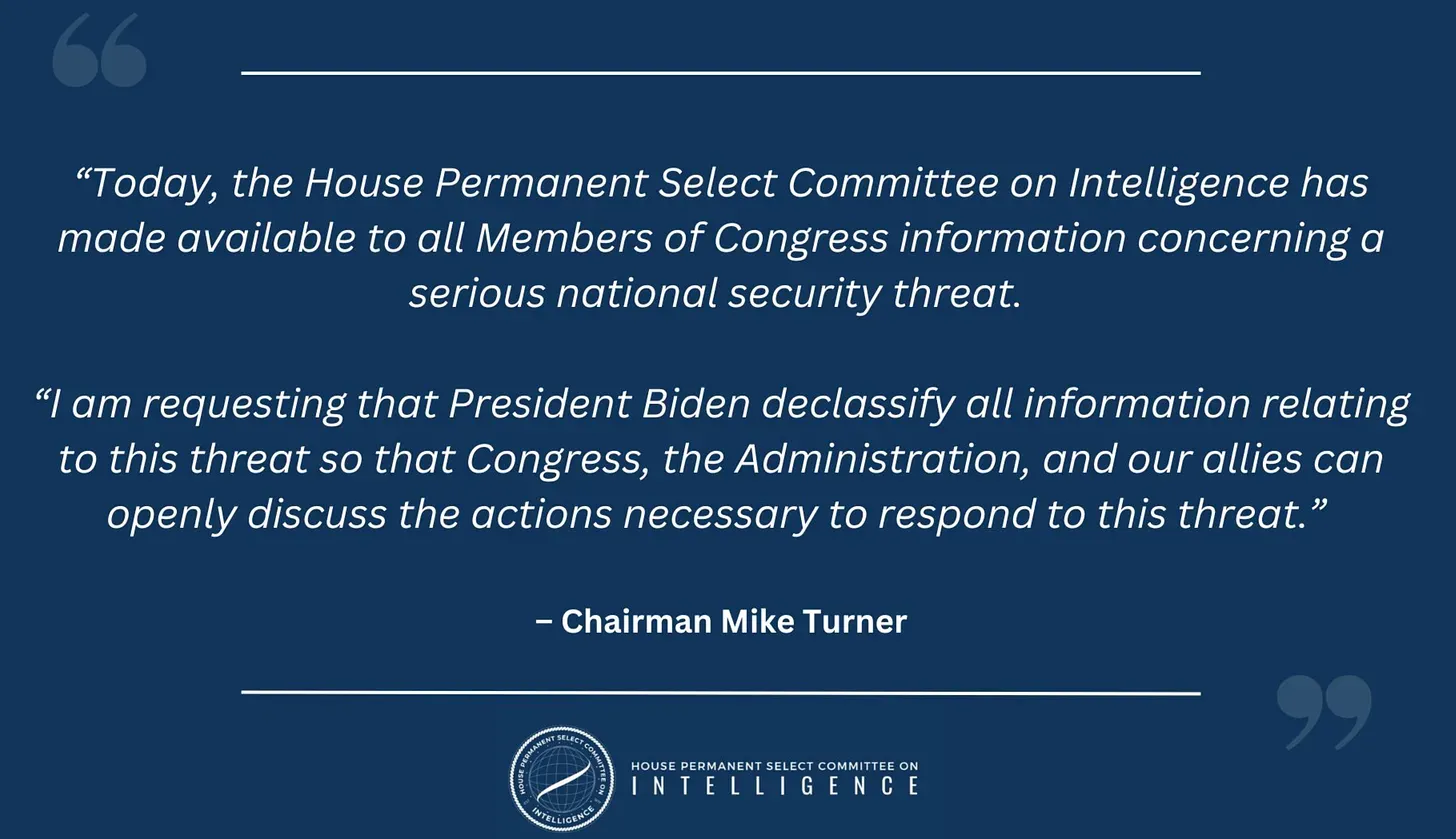Some members of Congress are trying hard, playing political games with scare tactics, to save FISA and Section 702. It’s not worth saving. In fact, FISA is the current apogee of weaponized intelligence, and the closest thing to a national omniopticon we, or any nation (China excepted), has ever had—a digital, all-seeing-eye controlled by a power we didn’t elect. Think Sauron on your cellphone. We really should let it die.
FISA was born with the best on intentions, but it has conveyed far too much power to a concentrated group of people who operate in complete secrecy, many of whom I wouldn’t trust with my car keys, never mind my communications history.
Section 702 of the Foreign Intelligence Surveillance Act was passed by Congress in the final year of George W. Bush’s second term. Keep that year in mind, as its significance will become apparent. The umbrella law, FISA, was passed into law during Jimmy Carter’s term, in 1978. FISA was hailed the answer to the CIA’s tilt away from human intelligence and traditional “spycraft,” in the wake of the Rockefeller Commission report. That report concluded the CIA engaged in some really awful and extra-legal operations against domestic targets, so Congress was out to reform the agency.
HUMINT—human intelligence—long the haunt of the spy agency, was largely supplanted by the signals and electronic intelligence, ELINT. The two methods of intelligence-gathering have always worked side-by-side, and sometimes in competition with each other. They are not the only tools in the spy chest: Other domains of intelligence (such as Denial and Deception: D&D) are used as well. Our spy industry is very good at most of these methods, though HUMINT has suffered some very public, embarrassing failures.
I am no expert on these things, but the CIA has its own history resources. You can read it for yourself.
The FISA law set up an intelligence-gathering—wiretapping or eavesdropping—structure that is designed to target foreign individuals outside the United States, who may or may not be having conversations with U.S. citizens inside or outside the U.S. It also authorizes a special, secret court, the Foreign Intelligence Surveillance Court (FISC) to grant orders for targeting communications of individuals operating inside the U.S., who may be U.S. citizens, suspected to be “agents of a foreign power.” The operation of the FISC, and the intelligence community lawyers who present cases before it is, by its very nature, top secret.
In general, the U.S. government’s intelligence community, which now functions as a melange of agencies under a common command, can go to the FISC and ask permission to surveil a person or company. The original intent was that the IC and the FISC would operate in good faith, but not everyone outside the intelligence community likes to cooperate, especially communications companies handling their clients’ data.
In 2008, Congress expanded FISA, adding Section 702, which, as I mentioned, allows targeting of suspected “agents of a foreign power,” but not located in the U.S., except when such agents communicate with people actually in the U.S. It also sets up a procedure for FISC to compel private companies to assist the government in its surveillance.
A) Order to compel. --If an electronic
communication service provider fails to comply with a
directive issued pursuant to paragraph (1), the
Attorney General may file a petition for an order to
compel the electronic communication service provider to
comply with the directive with the Foreign Intelligence
Surveillance Court, which shall have jurisdiction to
review such petition.Now about that pesky year Section 702 was passed: 2008. Prior to 2008, the Internet was largely a bunch of desktop PCs connecting via landline modems, cable modems, DSL, and slow digital lines like ISDN; also a smattering of battery-guzzling laptops, using spotty WiFi. Cell phones were mostly limited to SMS text messages sent on chiclet keyboards (or numeric keypads), and crappy cameras. The 3G technology offered speeds of up to a megabit (if you were lucky). The best connected device on the market was a Blackberry—the accessory du jour for the tech-savvy businessman. Then came the iPhone, and everything changed really fast.
Suddenly, Section 702 gave the government the keys to the kingdom of every type of communication it could hoover and jam into massive data centers, then filter through at its leisure. FISA became less of a targeted wiretap, and more a pro-forma step to use already-gathered ELINT for whatever purpose the IC desired.
With that kind of capability, the prospect for massive abuse isn’t just a possibility, it’s an irresistible reality.
I’m no fan of Edward Snowden. The only difference between Snowden and Tucker Carlson is that Snowden can’t leave his beloved Russia, while Tucker will sleep well in Maine after filing his monstrous propaganda pieces. Snowden did a tremendous amount of damage to our intelligence capabilities, but he did expose one thing that has greatly helped the cause of cyber security (he should come back and face the consequences, however). See, the NSA handily developed a pseudo-random number generator that did a good job providing “seed” numbers for crpytosystems, that power every form of encrypted communications. It was so convenient that the National Institute for Standards and Technology (NIST) adopted it as its standard, and many government agencies required its use. Only the NSA built this kit in a way that let them crack pretty much any encryption based on it. They could essentially read everyone’s mail. Snowden exposed that and shook the cyber community to its roots.
NIST may never regain the trust of the community. The NSA betrayal gave the Intelligence Community (IC) the kind of power generally reserved for tyrants like Joseph Stalin or Josip Tito.
Even before Section 702, the fusion between ELINT, HUMINT, cooperation between allied intelligence organizations (such as the British GCHQ), allowed President George W. Bush to sell his “Saddam has WMD” story to Congress, and to our coalition partners, using “sexed-up” analysis that conveniently omitted contrary opinions and inconvenient facts. After 2008, that toxic stew of IC assets, wielding FISA and Section 702, became as bad as the fictional Hydra of the Marvel comics.
Journalist Matt Taibbi, along with Michael Shellenberge and Alex Gutentag, recently wrote about how the CIA “cooked the intelligence” on the Trump Russia narrative, namely that the Russkies favored Trump over Hillary Clinton in 2016, just like Bush’s IC cooked WMD.
The effort to manufacture the Intelligence Community claim that Russians had a “clear preference” for Trump” was led by then-CIA Director John Brennan, whom sources also implicate in an unprecedented effort to place more than two dozen Trump aides and associates under surveillance prior to the election. U.S. intel leaders like Brennan coaxed foreign allies, particularly from so-called “Five Eyes” security partners like the United Kingdom, into “making contacts and bumping” Trump associates throughout 2016.
I have little doubt Taibbi and company have many of their facts straight, but not all their facts. For example, I laughed when I read how one source said the surveillance campaign “was just leveraging capabilities to undermine this rookie unprepared Trump campaign, because they were easy marks.” They were not easy marks.
Paul Manafort had 25 years of experience toppling governments, working within the IC and diplomatic corps, and plying the roiling seas of international intrigue working for bloody African dictators. Michael Flynn was Director of the Defense Intelligence Agency (fired by President Obama because he was reportedly “abusive with staff, didn’t listen, worked against policy, bad management, etc.”). As a retired general officer with almost unlimited access to intelligence data, Flynn knew how the IC worked, and was intimately familiar with the “Five Eyes” and its capabilities. And Roger Stone: he was the father of so many dirty tricks, even Lee Atwater had to look over his shoulder for the ever-present backstabbing blade.
No, the Trump team was not a bunch of rookies. They went after Hydra straight on and lost. Stone had to get a presidential pardon from Trump (undoubtedly he possesses some really juicy stuff to earn that in transactional Trump-world). Flynn is reduced to fleecing the flock, speaking to mainly churches in the Christian National circle. Manafort is at home, having lawyered his way out of federal prison in 2020, by claiming COVID was cramping his style. He will complete his sentence this November.
The fact that Trump’s trifecta of swamp-loving intelligence hogs got stomped by the IC, and kicked so hard to the curb that the media is still enjoying reprints of the flat-out spoon-fed lies they ran in 2016, to me makes the maleficence of FISA and Section 702 even more frightening than if the CIA took on rookies.
But the intelligence chiefs love having the kind of power they’ve owned since Section 702 became law. It was supposed to expire in late 2023, but Congress, as has become its only operating principle, kicked the can down the road until this April. Now the spymasters, high on their own flatulence, don’t want to give it up. Many in Congress want to reform FISA and Section 702, but they aren’t in a hurry, Roll Call reported.
“In order to allow Congress more time to reach consensus on how best to reform FISA and Section 702 while maintaining the integrity of our critical national security programs, the House will consider the reform and reauthorization bill at a later date,” Raj Shah, a spokesman for Speaker Mike Johnson, R-La., said in a social media post.
Not being good enough for the folks who gather data by the exabyte per day, then decide who is naughty and nice after plowing through it, the IC somehow convinced the Chairman of the House Permanent Select Committee on Intelligence, Republican Mike Turner, to go full “this is not a drill.”

Erick Erickson was so outraged by this statement—which was significant enough to cause the stock markets to blip—that he called for Turner to lose his chairmanship. CNN reported that other Republicans are equally upset with Turner.
“It’s f***ing bullsh*t,” one prominent House Republican told CNN of Turner’s move. “He ought to lose his job. He did that to get his way on FISA.”
In other words, there is no actual “serious national security threat” that requires the Biden administration to immediately act in response. The “threat” is simply that Russia is looking into deploying space-based nuclear anti-satellite systems, which we’ve known for years.
CNN reported Wednesday that the US has new intelligence on Russian military capabilities related to its efforts to deploy a nuclear anti-satellite system in space, according to multiple sources familiar with the intelligence. The intelligence was briefed to Congress and key US allies, and some lawmakers say it is serious enough that it should be declassified and made public.
The Russians have been working on space-based nukes for decades, and it is actually prohibited by the Outer Space Treaty of 1967, one of the few treaties that Vladimir Putin has not broken or exited. The Russians, if they decided to throw away the Outer Space Treaty, would only be harming themselves, as the U.S. and other nations have capabilities likely beyond what Russia can do. Why start a space-based Cold War when you already lost the space race and the Cold War?
Though space nukes is an interesting, even compelling subject to discuss, it’s not worth raising a five-alarm fire over right now. Turner did it to get attention so he could have the FISA Section 702 reauthorization passed. His ploy backfired hard.
I say good, and good riddance. Let Section 702 die on April 19, or let Congress pass a reform bill to clip FISA’s wings. A program like FISA, and an organization like FISC, don’t deserve to exist in a country as rooted in independence, liberty, and privacy as the United States. The history of the program’s abuse has probably not even begun to be told, and the stuff that has made it out into the public is pretty bad.
The law that enabled the two largest intelligence scandals of the last 30 years: Iraq WMD and Trump Russiagate, which supercharged the conspiracy theories dealing with the 2020 election, and haunts us even to this day, doesn’t deserve to be reauthorized.
The sooner we dispose of our spymasters’ omniopticon tools, the safer I’ll feel.
Follow Steve on Twitter @stevengberman.
The First TV contributor network is a place for vibrant thought and ideas. Opinions expressed here do not necessarily reflect those of The First or The First TV. We want to foster dialogue, create conversation, and debate ideas. See something you like or don’t like? Reach out to the author or to us at ideas@thefirsttv.com.







